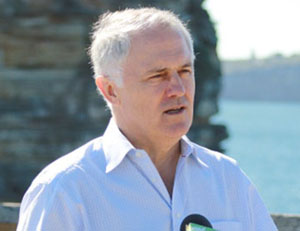Turnbull will be a worthy foe for Conroy

Newly selected Shadow Communications Minister Malcolm Turnbull will be a worthy adversary to Communications Minister Stephen Conroy.

Malcolm Turnbull (Credit: Malcolm Turnbull's Office)
Whether the Liberal Party will admit it or not, the 2010 Federal Election was partially decided on the strength of Labor's National Broadband Network (NBN). Both Tony Windsor and Rob Oakeshott highlighted that broadband was a key factor in their decision to side with Prime Minister Julia Gillard to allow Labor to form a minority government.
In the wake of the election, Nationals Leader Warren Truss and the Liberals Shadow Finance Minister Andrew Robb said that the Coalition's broadband plan was like an angsty teenager, just "misunderstood".
Part of the reason for that may have been Shadow Communications Minister Tony Smith's decision to wait until a week out from the election to announce the policy. The announcement also came just one hour before a debate on ICT issues scheduled between himself, Conroy and Greens IT spokesperson Scott Ludlam. Smith struggled to explain the policy in detail to journalists and fared even worse in the debate.
He wasn't even the first to announce the Coalition's opposition to Labor's planned internet filter. That job went to Shadow Treasurer Joe Hockey.
Former Liberal Leader Malcolm Turnbull, on the other hand, is no stranger to the sector, having been the chairman of internet service provider OzEmail from 1994 to 1999. Turnbull has been sitting on the backbench since he was deposed from the leadership of the Liberal Party by Tony Abbott in December 2009, but has still felt passionate enough to publish a lengthy blog post on his own website before the election detailing the reasons he believed that Labor's National Broadband Network wasn't the proper solution for Australia.
"There is no benefit to taxpayers or the Australian economy from spending $43 billion or more on something that turns out to have a commercial value of a fraction of that when it is finished and sold. Risks like this are better born by the private sector — so shareholders, not Australian taxpayers, lose out if the plan goes off the rails," Turnbull wrote in the blog.
In the course of the election campaign, Turnbull also held his own anti-internet filter forum in his electorate with Liberal MP for Bradfield and former Optus director of corporate and regulatory affairs Paul Fletcher; BigPond chief Justin Milne; and Simon Sheikh, national director of political advocacy group GetUp!
Turnbull used the event to declare Labor's policy for mandatory internet filtering as "dead, buried and cremated", since the Liberal Party and the Greens' vote against the policy would ensure its demise in the Senate.
The new shadow communications minister is also one of the most engaged Liberal Party politicians on the social-networking site Twitter.
Put simply: giving Turnbull the comms role allows him to play to his strengths. He will be able to effectively hold Conroy to account and he will give the Opposition an edge where Labor has beat it consistently. In addition, the position will not allow Turnbull to undermine Abbott's leadership.
And, as the ABC's Annabel Crabb noted on Insiders over the weekend, Malcolm Turnbull is the only Australian politician with his own iPhone app.